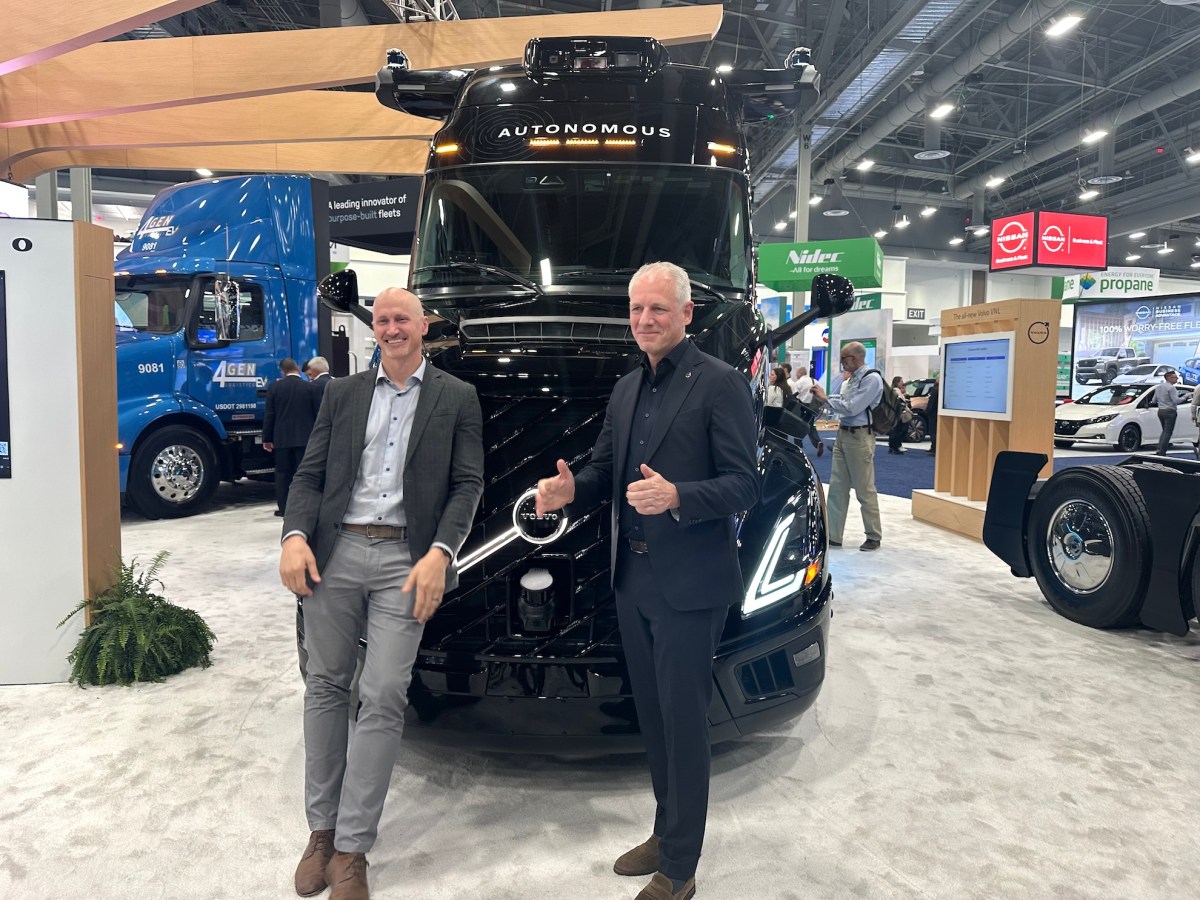A new self-driving truck — manufactured by Volvo and loaded with autonomous vehicle tech developed by Aurora Innovation — could be on public highways as early as this summer. The Volvo VNL Autonomous truck, which was revealed Monday evening at the ACT Expo in Las Vegas, is the product of a partnership between Aurora and […]
© 2024 TechCrunch. All rights reserved. For personal use only.
A new self-driving truck — manufactured by Volvo and loaded with autonomous vehicle tech developed by Aurora Innovation — could be on public highways as early as this summer.
The Volvo VNL Autonomous truck, which was revealed Monday evening at the ACT Expo in Las Vegas, is the product of a partnership between Aurora and Volvo Autonomous Solutions. Aurora plans to start hauling freight using these Volvo self-driving trucks in the next several months. The trucks will be in autonomous mode and will still have a human safety operator behind the wheel to take control if needed.
Later this year, the company plans to announce pilot programs with customers that will use the Volvo VNL Autonomous truck, according to an Aurora spokesperson. Volvo has already started to manufacture an initial test fleet of these self-driving trucks at its New River Valley assembly facility in Virginia.
The reveal of the Volvo VNL Autonomous truck comes as Aurora continues to push towards its stated goal to commercialize self-driving trucks by the end of 2024. The company initially plans to carry freight between Dallas and Houston using up to 20 driverless Class 8 trucks — this time with no human behind the wheel. Aurora declined to share whether trucks made by Volvo, or its other partner Paccar, would be in that inaugural driverless fleet.
Getting to commercialization is existential for Aurora — one of the last autonomous trucking companies standing. Last year, Waymo Via put the brakes on its self-driving trucking program, and TuSimple recently left the U.S. market in favor of expanding in Asia. Aurora has not been immune to the high-capital costs of developing and then launching commercial autonomous trucks either. In January, the company laid off 3% of its workforce in order to trim costs in advance of its commercial launch.
Consolidation in the AV industry has meant fewer rivals for Aurora. Einride, Torc and Kodiak Robotics, which revealed its own purpose-built self-driving big rig, are among the few that remain.
The Volvo partnership, which the companies first inked in March 2021, is one part of Aurora’s commercialization strategy. Aurora has launched pilot programs with logistics companies FedEx, Ryder, Schneider and Uber Freight. In January, Aurora and automotive supplier Continental closed the first phase of a more than $300 million project to mass produce autonomous vehicle hardware for commercial self-driving trucks. The two companies finalized the design and system architecture for an AV hardware kit, as well as the blueprint for a secondary computer that can take over operations if a failure occurs. The Continental hardware kit won’t be in Aurora trucks until 2027, but the Volvo VNL will still be packed with safety features, the company says.
The Volvo truck features redundant steering, braking, communication, computation, power management, energy storage and vehicle motion management systems, according to Aurora. The truck is also integrated with the so-called Aurora Driver, a self-driving system that includes dual computers, self-driving software, in-house lidar that can detect objects more than 1,300 feet away, high-resolution cameras and imaging radar.
“Our platform engineering approach prioritizes safety by incorporating high-assurance redundancy systems designed to mitigate potential emergency situations,” said Shahrukh Kazmi, chief product officer at Volvo Autonomous Solutions, in a statement. “We built the Volvo VNL Autonomous from the ground up, integrating these redundancy systems to ensure that every safety-critical component is intentionally duplicated, thereby significantly enhancing both safety and reliability.”
Once Aurora and Volvo have validated this platform, the plan is to start fully driverless operations with a “modest-sized fleet of trucks,” according to the Aurora spokesperson, who declined to provide a specific timeline. The spokesperson said that over the next few years, Aurora and Volvo expect to start high-volume production of the Volvo VNL integrated with the Aurora Driver.

Leave a Reply